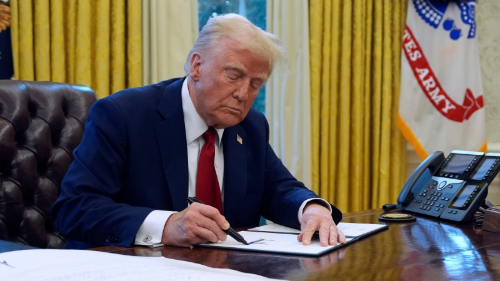IMF Slashes Global Growth Outlook on Impact of Trump Tariffs

TLDR
- The International Monetary Fund has downgraded its 2025 global growth forecast to 2.8%, down 0.5 percentage points from January
- The IMF said its latest numbers exclude tariff increases announced after April 4, including new US levies on Chinese imports that now reach 145%
- The US growth outlook for 2025 was cut to 1.8%, a 0.9-point downgrade, while inflation is expected to hit 3.0%
The International Monetary Fund has downgraded its 2025 global growth forecast to 2.8%, down 0.5 percentage points from January, citing increased trade tensions sparked by US tariff actions. Growth is expected to recover modestly to 3.0% in 2026.
The forecast was released during the IMF and World Bank Spring Meetings in Washington. The IMF said its latest numbers exclude tariff increases announced after April 4, including new US levies on Chinese imports that now reach 145%. If sustained, those could further dampen growth.
The US growth outlook for 2025 was cut to 1.8%, a 0.9-point downgrade, while inflation is expected to hit 3.0%. China’s growth forecast fell to 4.0%, down from 5.0%, and Mexico is now projected to contract by 0.3%. Growth in the eurozone was lowered to 0.8%. The IMF warned that policy uncertainty, trade disruptions, and inflationary pressures may weaken demand and increase global prices.
Daba is Africa's leading investment platform for private and public markets. Download here
Key Takeaways
Sub-Saharan Africa is expected to grow 3.8% in 2025 before rebounding to 4.2% in 2026. But global trade tensions may limit export demand and increase import costs, especially for fuel and food. The region’s reliance on external trade and imported inflation makes it vulnerable to tariff-driven price hikes. The IMF projects inflation in emerging economies will reach 5.6% in 2025, with food and energy prices a major risk. For net importers across Africa, this squeezes household incomes and fiscal space. Additionally, higher US interest rates and a stronger dollar raise debt servicing costs, limiting investment in infrastructure and public services. Some African economies with diversified exports or commodity gains, such as Senegal and Guinea, are forecast to grow above 7%, but regional inequality and external dependencies persist. The IMF emphasizes the need for macroeconomic reforms, stronger public investment frameworks, and resilient infrastructure to cushion global shocks. Multilateral support will also be key in ensuring Africa remains on a sustainable growth path.

Next Frontier
Stay up to date on major news and events in African markets. Delivered weekly.
Pulse54
UDeep-dives into what’s old and new in Africa’s investment landscape. Delivered twice monthly.
Events
Sign up to stay informed about our regular webinars, product launches, and exhibitions.




